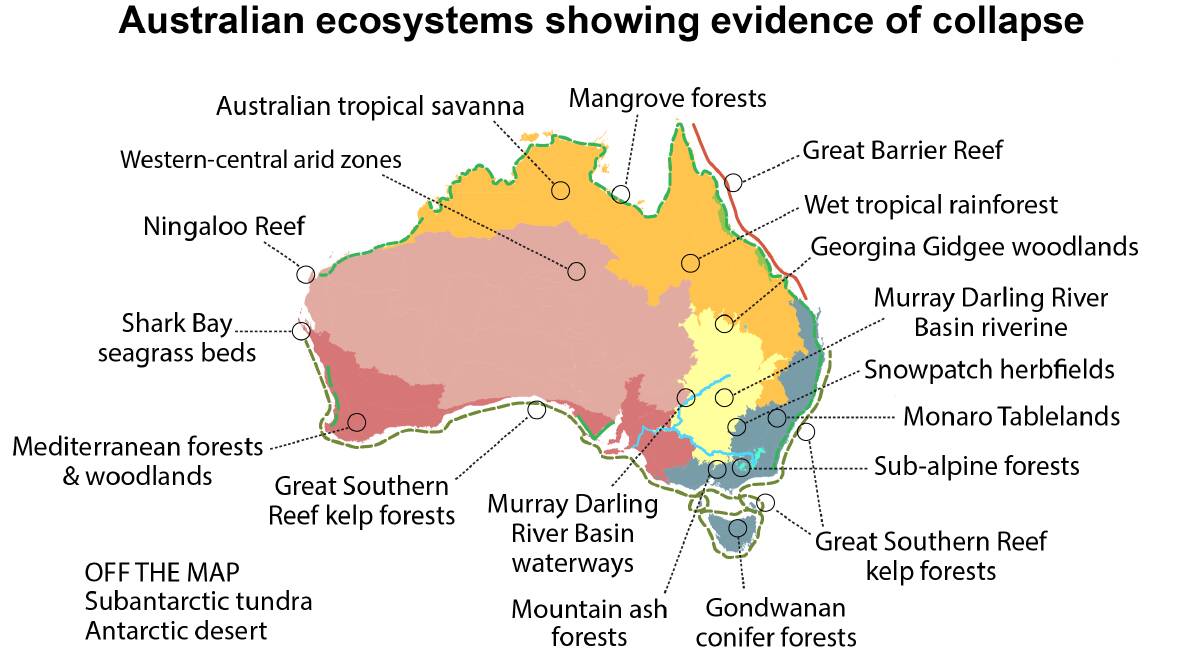
Two Tasmanian ecosystems have been listed as on the brink of collapsing in a new return detailing the extent of the degradation of Australia's natural areas.
Subscribe now for unlimited access.
or signup to continue reading
The report authored by 39 scientists from 29 government agencies and universities found that urgent change was needed to prevent the complete loss of 19 ecosystems around Australia - including Tasmania's Gondwanic forests and East Coast kelp forests.
Report lead author Dr Dana Bergstrom, from the Australian Antarctic Division, said none of the 19 ecosystems had yet suffered complete collapse but, all showed signs of significant change in some areas.
IN OTHER NEWS:
"We documented 19 examples, which include mangroves in the Gulf of Carpentaria, the arid zone of central Australia, Shark Bay seagrass beds in Western Australia, Great Southern Reef kelp forests, Mountain Ash forest in Victoria, and moss beds of East Antarctica," she said.
"The causes of the collapses are varied and include long-term pressures such as changed climate, habitat loss and pest species, but also short-term pressures such as heatwaves, storms and fires."
Co-author and University of Tasmania Professor of pyrogeography and fire science David Bowman said evidence from mainland forests showed how Tasmania's Gondwanic forests may be effected by increasing fire events.
He said more aggressive forest management - including prescribed burning and mechanic interventions - may be required to prevent forests collapsing.
"The eucalyptus forests which I have studied in the mainland where they have been hit by these incredibly severe fires since the turn of the century and there are areas now where forests are struggling to grow," Professor Bowman said.
"Fortunately that hasn't happened here in Tasmania. Our forests are being burnt but they are still recovering. But it is certainly a warning light that if this trend of increasing fire activity continues then we are going to actually see declines in forest productivity."
Professor Bowman said the thing that Gondwanic forests, mangroves and kelp forests all had in common was that they were all under stress.
UTAS Institute for Marine and Antarctic Studies Professor of marine sciences and report co-author Craig Johnson said there are two main things affecting the kelp population on the East Coast.
The first is warmer waters killing giant kelp and the second is the invasion of sea urchins who eat the common kelp.
Professor Johnson said tackling the impacts of climate change would require a global approach. But that the effects of climate change are often exacerbated by local stresses.
"If there is overfishing of predators, if there is poor water quality - those sorts of disruptions ... then the effect of the climate change will be worse," Professor Johnson said.
"By managing things like fishing and water quality and restoration attempts better and better we can minimise the impacts of the climate change stuff.
"We still need to be urging governments and so forth to be working towards doing everything they can to reduce global warming."
He said projects were underway to try and minimise the effects of the urchins and to probe the viability of reseeding the giant kelp forests with temperature resistant strains.















